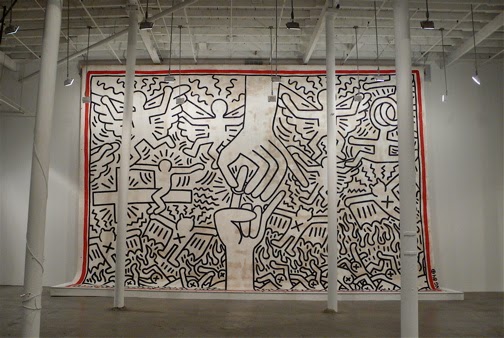I wanted to share two particularly meaningful stations from this past week. At one, we practiced "listening in color," where we were invited to "Consider the drawing on the table, made as a prayer response to Isaiah 40. Take one of the copies and carefully and prayerfully choose what colors you feel fit the different parts of the image, meditatively coloring its different parts in. How can adding color to this visual of scripture be a means of prayer and listening more deeply to God and God’s word?" The images below show some of our responses:
Another station was "Listening through Lament." One of the major voices of the prophets—and of Advent—is the voice of lament. The voice crying out to be heard amidst pain, to declare despair over all that is broken, the voice that wonders where God is amidst all that is going wrong. The major cry of the prophets is the one heard in Isaiah 21: “How long?” After reading some biblical laments, participants were invited to join their voiecs to a communal lament begun on a sheet of paper posted on the wall. They were asked to add one, two, or three lines to this prayer crying out for God’s presence and attention, for God to listen to the cries of God’s people. What do you lament in this season of Advent? Where do you cry out for night to end and the light of dawn to break through? Here is the lament we came up with; each color in a different line represents the voice of a different person who added to the prayer (I took out individual names not knowing if it was okay to post them on the internet, leaving just initials):
How long, O Lord?
Lord, bring light to those in darkness--those seeking to find you.
Bring peace to the hearts of those in turmoil, crying out for justice.
Must the people of Zimbabwe, Syria, India, Pakistan, Bangladesh, Israel and Palestine, and on and on suffer those who oppress? How long, O Lord.
Show me where I too oppress and lead me to a higher ground--forgive me--help me--help us all.
The anguish of B.H. in Nigeria. The destruction of much in the Central African Republic where Father A. has labored so long. Hatred and destruction in Palestine/Israel.
Lord comfort A., C., J., Father A--forgive me for overlooking similar injustices.
How long shall this night be, O Lord?
Let us walk in the dark, as long as it takes,
for us to recognize true light, and shine it forth.
Then come, Lord Jesus--
come to make us whole.
Join us this Tuesday at 6pm as we continue this listening journey together.




















































